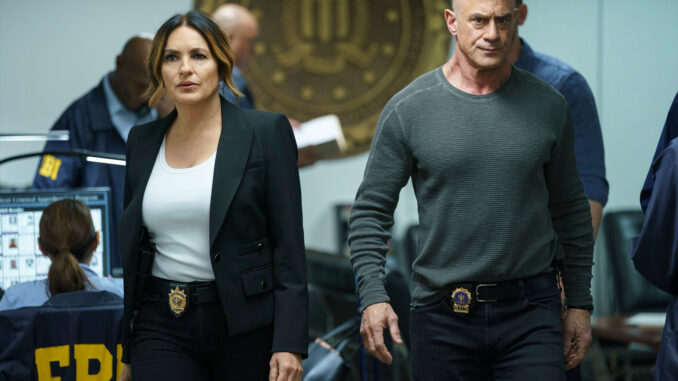
The air in the squad room was thick with the ghost of holiday cheer, swiftly replaced by the grim pallor of a winter night. This wasn’t just any night, though. This was the night of Law & Order: SVU‘s Season 27 Fall Finale, and by the time the credits rolled, I felt a knot of dread tightening in my stomach. Not because of a particularly gruesome perp, or a gut-wrenching victim story, but because Olivia Benson’s nemesis, a figure introduced with quiet menace earlier in the season, had dropped a truth bomb so potent, so undeniably true, that it threatened to shatter the very foundation of the show. And now, I’m nervous.
Let’s call him Dr. Aris Thorne. Not a sociopathic serial offender, nor a corrupt politician, but a brilliant, charismatic legal philosopher and advocate for victims’ rights – with a radical twist. Thorne, a former victim of a deeply flawed justice system himself, had spent the season quietly building a case, not against individual perps, but against the system itself, against the very premise of SVU’s relentless pursuit of “justice.” His methods were ethically dubious – using public shaming, manipulating media narratives, and advocating for community-led restorative justice practices that skirted legal boundaries – but his rhetoric was devastatingly persuasive.
The finale saw Thorne, having meticulously documented a multi-year pattern of systemic failures in a high-profile child sex trafficking case that SVU had worked tirelessly on (and, critically, failed to fully resolve years prior), stand before a national audience. He wasn’t grandstanding, not truly. He was dissecting. He calmly laid out how, despite Olivia Benson’s heroic efforts, despite countless hours and resources poured into the case, the system had ultimately allowed key perpetrators to escape full accountability, secondary victims to fall through the cracks, and the underlying societal conditions that enabled such crimes to persist unchecked.
“You speak of justice,” Thorne had said, his voice quiet but echoing with an undeniable authority, looking directly into the camera, implicitly at Benson herself. “But what is justice when it is too slow, too blind, too fragmented? When it focuses on individual villains while the infrastructure of exploitation remains firmly in place? When it purports to heal, but only offers a fleeting salve over a gaping wound that continues to fester beneath the surface? Detectives like Captain Benson are heroes, yes. They are the emergency responders to a house on fire. But I ask you, is it not time to stop building houses of straw? To address the architects of the fire itself?”
That was it. That was the “good point.” It wasn’t about whether a specific rapist deserved to be behind bars; it was about the efficacy, the very purpose, of the system SVU operates within. Thorne wasn’t just saying the system was flawed; he was arguing it was fundamentally designed to be ineffective against systemic evil, a Sisyphean task for valiant individuals. He was arguing that SVU, by focusing on individual crimes, inadvertently distracts from the deeper, societal rot that creates those crimes. He essentially called Olivia Benson a magnificent, tireless band-aid on a hemorrhaging limb.
And I’m nervous because he’s not wrong.
For over two decades, we, the viewers, have cheered for Benson, celebrated every conviction, lamented every failure, and believed, implicitly, in the premise that SVU, through its dedicated work, was making the world a safer, more just place, one perp at a time. But Thorne’s point rips that comfortable blanket away. He shines a harsh, unforgiving light on the cracks in the edifice, the gaping holes that even the most determined detective can’t plug. We’ve seen enough real-world headlines, enough documentaries, enough stories of victims let down by bureaucracy, legal loopholes, and societal apathy, to know that Thorne’s critique isn’t a villain’s delusion; it’s a stark, uncomfortable truth.
How does Olivia Benson, the embodiment of unwavering belief in justice, move forward when faced with such an incisive, well-articulated indictment of her life’s work? Her entire career has been dedicated to working within that system, to bending it, cajoling it, screaming at it to do better. If Thorne is right, then much of her heroic struggle has been, at best, a noble but ultimately futile gesture. It reduces her fight from a crusade against evil to a desperate attempt to patch a sinking ship.
The nervousness I feel isn’t just for Benson’s character arc; it’s for the show itself. If Thorne’s point is truly absorbed, how can SVU continue with the same premise? Does it pivot to become a show about dismantling oppressive structures? Does it force Benson to step outside the law, to become more like Thorne, embracing radical change? Or does she, and the show, simply double down on the individual fight, acknowledging Thorne’s point but dismissing it as too nihilistic for practical application? Any of these paths feels like a foundational tremor.
Dr. Aris Thorne isn’t just a new bad guy; he’s an ideological threat that has exposed the precariousness of SVU’s entire universe. He’s forced us, the viewers, to confront the uncomfortable truth that sometimes, the institutions we rely on for justice are part of the problem. And now, as I wait for the spring premiere of Season 27, I’m not just wondering how Benson will catch her next perp. I’m wondering how she (and by extension, the show) will reconcile the profound, unsettling “good point” that her nemesis made, and what it means for the future of justice, both on screen and off. My nerves are jangling, awaiting the answer.
